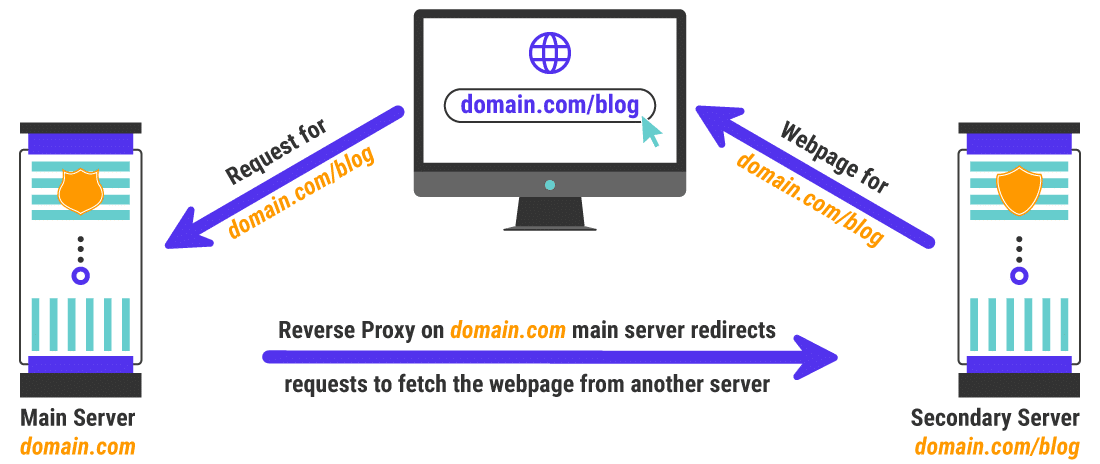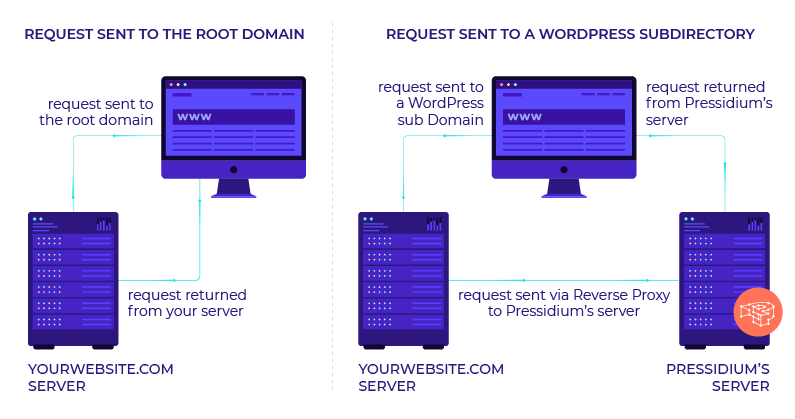Moz Q&A is closed.
After more than 13 years, and tens of thousands of questions, Moz Q&A closed on 12th December 2024. Whilst we’re not completely removing the content - many posts will still be possible to view - we have locked both new posts and new replies. More details here.
WordPress Sub-directory for SEO
-
Hi There,
I'm working on a WordPress site that includes a premium content blog with approx 900 posts.
As part of the project, those 900 posts and other membership functionality will be moved from the main site to another site built specifically for content/membership.
Ideally, we want the existing posts to remain on the root domain to avoid a loss in link juice/domain authority.
We initially began setting up a WordPress Multisite using the sub-directory option. This allows for the main site to be at www.website.com and the secondary site to be at www.website.com/secondary.
Unfortunately, the themes and plugins we need for the platform do not play nicely with WordPress Multisite, so we started seeking a new solution, and, discovered that a second instance of WordPress can be installed in a subdirectory on the server. This would give us the same subdirectory structure while bypassing WordPress Multisite and instead, having two separate single-site installs.
Do you foresee any issues with this WordPress subdirectory install? Does Google care/know these are two separate WordPress installs and do we risk losing any link juice/domain authority?
-
@himalayaninstitute said in WordPress Sub-directory for SEO:
WordPress can be installed in a subdirectory
I have done this a lot and I mean a lot what you want to do is set up a reverse proxy on your subdomain and this will allow you to not only bypass having to use multisite for subfolder but if you want to power it separately you can you do not have to it all. You should probably use your same server and power through Fastly our CloudFlare


once you set this up it is super easy to keep it running in your entire site will be much faster as a result as well
my response to someone else that needed a subfolder
https://moz.com/community/q/topic/69528/using-a-reverse-proxy-and-301-redirect-to-appear-sub-domain-as-sub-directory-what-are-the-seo-risksplease also look at it explained by these hosting companies is unbelievable easy to implement compared to how it looks and you can do so with Fastly or cloudflare in a matter of minutes
-
https://servebolt.com/help/article/cloudflare-workers-reverse-proxy/
-
https://support.pagely.com/hc/en-us/articles/213148558-Reverse-Proxy-Setup
-
https://wpengine.com/support/using-a-reverse-proxy-with-wp-engine/
-
https://thoughtbot.com/blog/host-your-blog-under-blog-on-your-www-domain
-
https://crate.io/blog/fastly_traffic_spike
*https://support.fastly.com/hc/en-us/community/posts/4407427792397-Set-a-request-condition-to-redirect-URL -
https://coda.io/@matt-varughese/guide-how-to-reverse-proxy-with-cloudflare-workers
-
https://www.cloudflare.com/learning/cdn/glossary/reverse-proxy/
-
https://gist.github.com/LimeCuda/18b88f7ad9cdf1dccb01b4a6bbe398a6
I hope this was of help
tom
-
-
@nmiletic The content section of the site requires a unique UI Design and other robust functionality, so having a separate theme/plugins in its own directory is going to be the way we go here. Thanks for your assistance!
-
@himalayaninstitute Have you thought about adding a page and making all of this new content a subpage? Or changing your permalink structure to include a category in the URL? You can then add all of these posts under that category and have the URL show up as www.example.com/category/page-or-post-name
-
The website at the subdirectory will be an online learning platform with a blog, online courses, memberships, gated content, etc. The content currently lives on the main site, so, it's great that we can move it into the subdirectory without taking a hit from Google.
Since these are fundamentally two separate websites, we're not concerned about needing to manage them independently.
Thanks again for your input and advice, we greatly appreciate it!
-
@amitydigital said in WordPress Sub-directory for SEO:
Google will view it as one site so you shouldn't have any issues from that perspective. The Google bot is just looking at pages and won't know/care that the underlying CMS that is running some pages is a different install than other pages. The downside is you now have two websites to maintain, two themes, two sets of files, etc... That may result in a bit of a headache in the future.
As @amitydigital put it, the issue with your approach would be repetitive tasks. You will not loose any DA nor PA (being that you implement a correct 301 redirection). What is going to be on the subdirectory?
-
Google will view it as one site so you shouldn't have any issues from that perspective. The Google bot is just looking at pages and won't know/care that the underlying CMS that is running some pages is a different install than other pages. The downside is you now have two websites to maintain, two themes, two sets of files, etc... That may result in a bit of a headache in the future.
Got a burning SEO question?
Subscribe to Moz Pro to gain full access to Q&A, answer questions, and ask your own.
Browse Questions
Explore more categories
-
Moz Tools
Chat with the community about the Moz tools.
-
SEO Tactics
Discuss the SEO process with fellow marketers
-
Community
Discuss industry events, jobs, and news!
-
Digital Marketing
Chat about tactics outside of SEO
-
Research & Trends
Dive into research and trends in the search industry.
-
Support
Connect on product support and feature requests.
Related Questions
-
Rel canonical tag from shopify page to wordpress site page
We have pages on our shopify site example - https://shop.example.com/collections/cast-aluminum-plaques/products/cast-aluminum-address-plaque That we want to put a rel canonical tag on to direct to our wordpress site page - https://www.example.com/aluminum-plaques/ We have links form the wordpress page to the shop page, and over time ahve found that google has ranked the shop pages over the wp pages, which we do not want. So we want to put rel canonical tags on the shop pages to say the wp page is the authority. I hope that makes sense, and I would appreciate your feeback and best solution. Thanks! Is that possible?
Intermediate & Advanced SEO | | shabbirmoosa0 -
What are best page titles for sub-folders or sub-directories? Same as website?
Hi all, We always mention "brand & keyword" in every page title along with topic in the website, like "Topic | vertigo tiles". Let's say there is a sub-directory with hundreds of pages...what will be the best page title practice in mentioning "brand & keyword" across all pages of sub-directory to benefit in-terms if SEO? Can we add "vertigo tiles" to all pages of sub-directory? Or we must not give same phrase? Thanks,
Intermediate & Advanced SEO | | vtmoz0 -
Is .ME domain is effective in SEO ?
I am always listening about TLD. com. org .net but what about the .me domain. Can this will be effective in SEO. Can i able to beat down my competitors, if i choose .me . I also have a .com or other TLD option but if i am making my name than .me is for me but i need your suggestion for the seo purpose. Is there really domain affective in term of SEO.
Intermediate & Advanced SEO | | pnb5670 -
SEO site Review
Does anyone have suggestions on places that provide in depth site / analytics reviews for SEO?
Intermediate & Advanced SEO | | Gordian0 -
Best Practices for Moving a Sub-Domain to a Sub-Folder
One of my clients is moving their subdomain to a subfolder on their main domain. (ie. blog.example.com to example.com/blog) I just wanted to get everyone's thoughts on some best practices for things we should be doing/looking for when making this move.? ie WMT, .htaccess, 301s etc? Thanks.
Intermediate & Advanced SEO | | DarinPirkey0 -
De-indexed Link Directory
Howdy Guys, I'm currently working through our 4th reconsideration request and just have a couple of questions. Using Link Detox (www.linkresearchtools.com) new tool they have flagged up a 64 links that are Toxic and should be removed. After analysing them further alot / most of them are link directories that have now been de-indexed by Google. Do you think we should still ask for them to be removed or is this a pointless exercise as the links has already been removed because its been de-indexed. Would like your views on this guys.
Intermediate & Advanced SEO | | ScottBaxterWW0 -
Does capitalization matter for SEO?
Two places capitalization comes into play: (1) on-page use (title, h1, body text, img alt text, etc) (2) external anchor text I didn't think it mattered from Google's point of view for on-page usage (is this correct?) but I notice that OpenSiteExplorer' s 'anchor text distribution' tab shows different counts for the same keyword if it's capitalized in different ways (eg seomoz.org is listed separate from SEOmoz.org). Is that just OSE or does Google treat the keyword/phrase different based on its capitalization, too? And if so, then should I be creating external links to my site with the 'regular' and 'Capitalized' versions of my key phrases?
Intermediate & Advanced SEO | | scanlin1